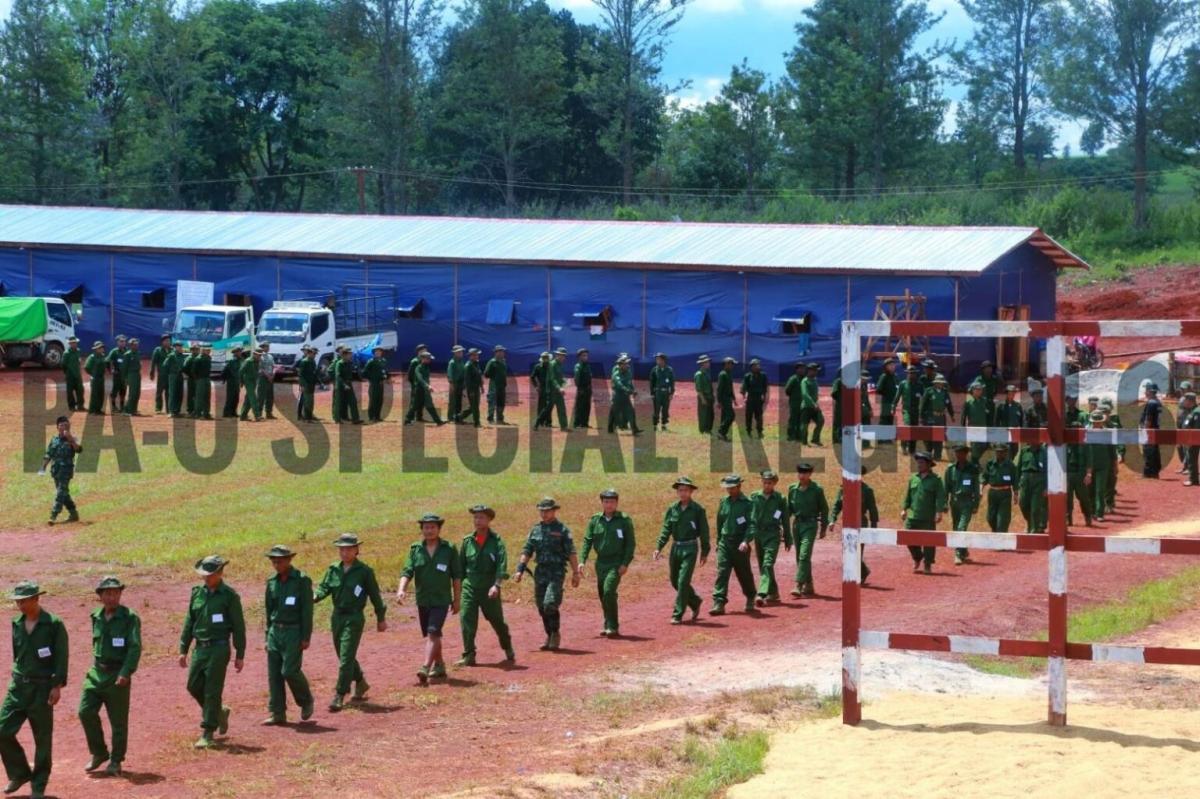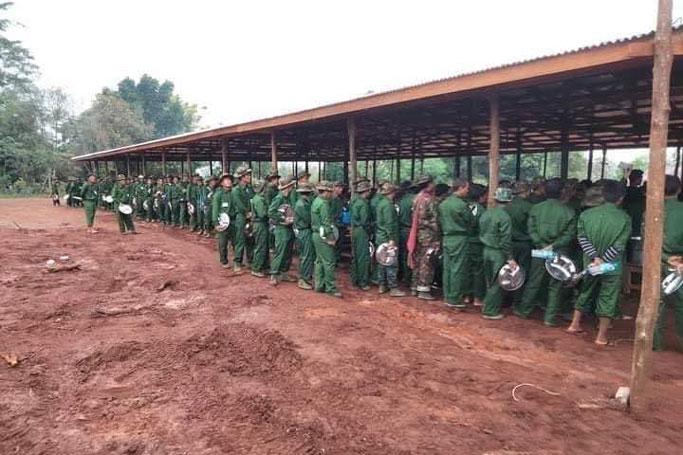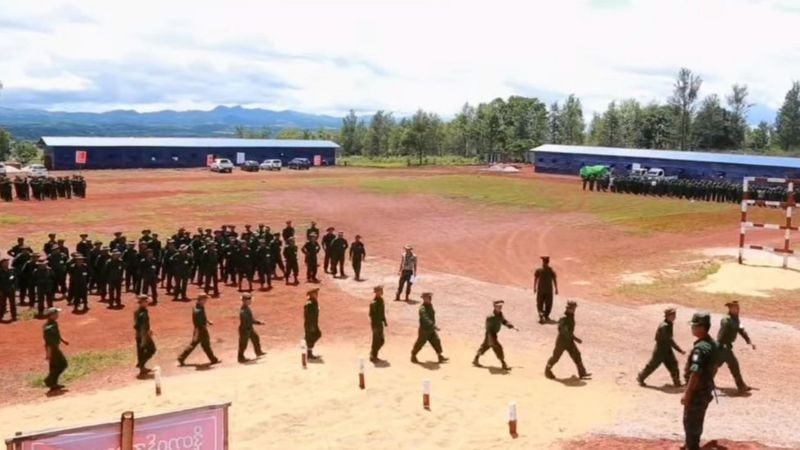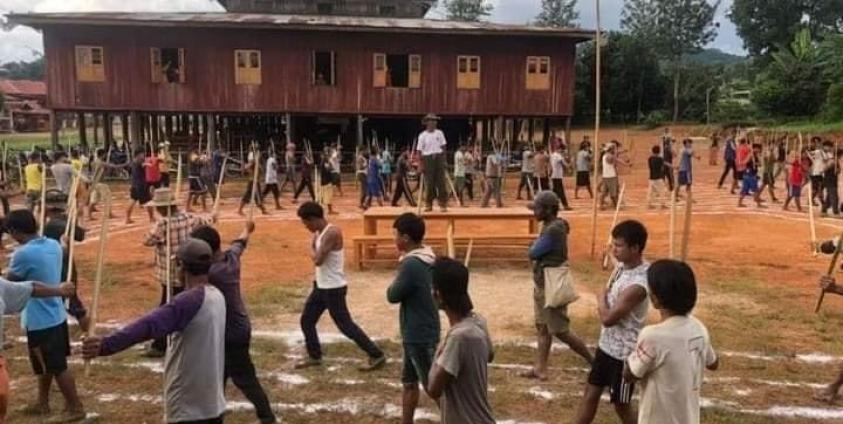Early in the morning, a group of young people begin their military training routine, their rhythm of "left, right, left, right" echoing through the air. Although they appear to be disciplined on the outside, most of them don't seem that really enthusiastic for this kind of training.
These individuals belong to the Pa-O ethnic group and live in the Southern Shan State, within an area controlled by the Pa-O National Organization/Army.
The PNO/PNA is a militia group, which operates under the authority of the State Administrative Council or the military. PNO/PNA has significantly increased its recruitment efforts in the wake of the military coup, actively enlisting new members and offering military training.
"In the wake of the military coup, every household is expected to send a young member, including women, for mandatory military training within the PNO, disclosed Khun Soe, a young Pa-O man who opted to use this name and who lives under the control area of PNO. "At the mere mention of PNO, young people flee their homes and mostly to Thailand to avoid recruitment" Khun Soe added.
In 1991, the PNO/PNA established a ceasefire agreement with the military, effectively designating their present controlled territories. But since the coup, the PNO has been actively recruiting young people from the areas they control for military training. According to those who had joined the training, the current batch is the seventh cohort to go through such training organized by the PNO.
Additionally, there have been allegations that those who complete PNO training are then compelled to fight alongside SAC or military forces against the People Defense Forces.
 In the aftermath of the coup, the PNO has also started the practice of asking Pa-O village households for financial contributions in order to buy weapons and ammunition. The range of these contributions is 30,000 to 100,000 MMK.
In the aftermath of the coup, the PNO has also started the practice of asking Pa-O village households for financial contributions in order to buy weapons and ammunition. The range of these contributions is 30,000 to 100,000 MMK.
An increasing number of young Pa-O people are beginning to raise concerns about possible political and military manipulation in light of these developments. The young people are skeptical of the motivations behind and suspecting that they might be unwittingly drawn into supporting the State Administrative Council (SAC).
"The organization is presently initiating a recall of young individuals, particularly targeting those who have previously participated in training sessions from earlier batches, as well as former organization members or ex-soldiers", Khun Soe who lives in PNO controlled area revealed.
The PNO started providing military training for those ages 18 to 35, starting from the beginning of June last year in 2022. The rationale provided for this initiative is to defend their own villages and regions.
The PNO's official announcement regarding the provision of military training outlines several justifications for this initiative. It emphasizes the intention to establish local defense security forces, aiming to safeguard the lives and property of the general populace, including the Pa-O ethnic group and other ethnic communities residing in the area. Furthermore, the stated purpose extends to ensuring stability and promoting peace within the Pa-O region.
Many young people are sidestepping the recruitment efforts by fleeing to Thailand. This choice is somehow motivated by their concern that, should they join, they may ultimately come under the control of the State Administrative Council (SAC) and become manipulated.
Also, those who had previously taken part in the PNO's 15-day military training have voiced a different perspective. Rather than intense military training, the lessons centered around very basic military exercises, such as marching. The majority of the training was devoted to lectures on Buddhism and cultural topics.
"Over the course of the 15-day training, our instruction primarily revolved around 'left, right, left, right' marching exercises. Following this, we delved into subjects related to culture," explained a Pa-O youth who participated in the second batch of training. "The training placed significant emphasis on instilling a sense of responsibility towards safeguarding our ethnic identity, nationality, religion, and cultural aspects. These teachings were delivered by monks with the intention of fostering a stronger bond between the youth, the monastic community, and the wider public," the youth continued.
According to the same Pa-O youth, there were approximately 500 participants in the second training cohort, including 40 women.
 Allegations have arisen suggesting that following the coup, the PNO has collaborated with the SAC or military in engagements within the Shan-Karenni border regions, as reported by local People's Defense Forces.
Allegations have arisen suggesting that following the coup, the PNO has collaborated with the SAC or military in engagements within the Shan-Karenni border regions, as reported by local People's Defense Forces.
Given that the PNO functions as a militia group under the control of the SAC, there is a high probability that they participate in various operations and activities that the SAC directs. Khun Benjamin from the Pa-O National Defense Force (Kham Kaung-KK) emphasized this point.
"Cooperation with the SAC or military can be presumed given the PNO's status as a militia group. Therefore, it could be assumed that the PNO takes part in a variety of military operations directed by the SAC," said Khun Benjamin.
With heightened conflict and tension prevailing along the Shan-Karenni border region, the collaboration between the PNO and SAC in combating the People's Defense Forces (PDF) has the potential to exacerbate ethnic divisions. Some of the younger Pa-O community members view this dynamic as a source of concern.
The military's skillful use of divisive tactics is clear, seen in how it creates conflicts among different ethnic groups. Even though these groups are united in their opposition and resistance to the dictatorship, the military's skilled manipulation has managed to spark internal rivalries and bloodshed inside the Pa-O communities.
"It's evident that the military is actively fostering conflict and discord among different ethnic communities. Their alignment with the SAC leaves them with little room to defy the SAC's directives, given their status as a militia group," Khun Benjamin expressed with a tinge of sadness.
 In the PNO controlled area, reports indicate that both youths and former soldiers are being summoned back.
In the PNO controlled area, reports indicate that both youths and former soldiers are being summoned back.
Consequently, Khun Soe pointed out that certain ex-soldiers, who were once part of the PNO but now opt not to return, are driven by a desire to refrain from killing or engaging in conflict with one another.
"I can only speak for our area, and in our context, ex-soldiers from the PNO seem to be actively avoiding rejoining the organization, citing various reasons," Khun Soe expressed.
Tragically, on March 11, 2023, a horrific incident, mass killings, unfolded in Nim Nain village, resulting in the loss of 22 civilians, including three monks and a woman. The blame for this tragic event was attributed in propaganda messages disseminated through social media, particularly the military's own Telegram channels, to the KNDF and PDF.
Following that, the PNO threatened and forced one member of each household in Kangyi Ward, which is located in Tabaung, Taunggyi, to participate in a demonstration on March 15. The purpose of the demonstration was to condemn the killings, and express opposition to the KNDF/PDF, with people repeating the phrase "We do not want KNDF/PDF."
Furthermore, the PNO is actively engaged in disseminating a narrative among the young individuals who enroll in their military training. They characterize the KNDF and PDFs as terrorist entities responsible for the destruction of villages.
"For a considerable duration, our Pa-O youth have been exposed to this narrative. The PNO is depicted in a positive light, while the PDFs are cast as aggressive terrorist groups. The core message being relayed is that if the PDFs come to the villages; our villages will be destroyed. The PDFs are solely to blame for the nation's current situation. The PNO employs this strategic narrative to attempt to persuade or even indoctrinate the youth," stated Khun Soe.
Likewise, another young Pa-O individual, Khun Shine (pseudonym used), expressed his belief that the Pa-O community would suffer a tarnished reputation following the revolution as a result of the PNO's cooperation with SAC in fighting various resistance forces.
"Our Pa-O people can be ignorant and naive. The legacy of subordination is still prevalent. Young people today have fewer rights and opportunities; and are discouraged from challenging and questioning. We are still unable to escape from the ties to race, religion, and culture". Khun Shine remarked with a sense of disappointment, "I worry that our Pa-O would lose face and face exclusion, particularly in the wake of this revolution."
Following PNO's peace deal with the military and in the aftermath of the military coup, Khun Soe highlighted that young Pa-O individuals were being subject to political exploitation and manipulation.
"We must reassess our perspectives. It's crucial that we truly understand what the PNO stands for. Any affiliation with the military and SAC should be met with opposition. Despite their assertions of working for the betterment of the Pa-O community, their actions are resulting in the loss of our youth," emphasized Khun Soe.







